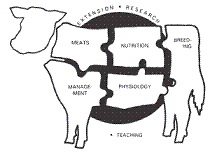Animal Science, Department of

Nebraska Beef Cattle Reports
Date of this Version
2011
Abstract
Updated meta-analysis of cattle performance equations were incorporated into the Biofuel Energy Systems Simulator (BESS) to more accurately evaluate the greenhouse gas (GHG) benefit of corn ethanol relative to gasoline. Partial drying or complete drying of wet distillers grains (DGS) reduces the feeding value of DGS for cattle and increases ethanol GHG emissions. Feeding wet DGS provides the optimum GHG benefit relative to gasoline, with associated ethanol emissions being 40% of gasoline. Ethanol production with dried DGS results in about 60% of the GHG emissions of gasoline when dry DGS is fed to feedlot cattle, dairy cows, and finishing swine.


Comments
Published in 2011 Nebraska Beef Cattle Report. Published by the Agricultural Research Division, University of Nebraska Extension, Institute of Agriculture and Natural Resources, University of Nebraska-Lincoln. Copyright © 2011 The Board of Regents of the University of Nebraska.